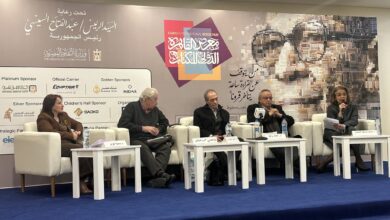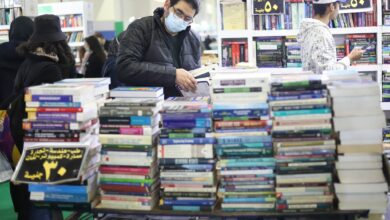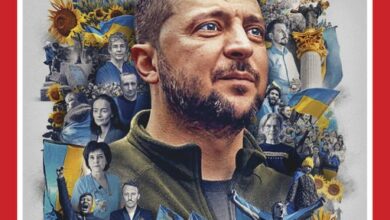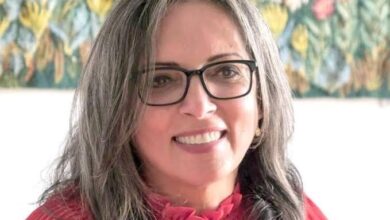In a ceremony held at the American University in Cairo’s (AUC) Oriental Hall on 11 December the AUC Press awarded Syrian writer Khalil Sweileh the 2009 Naguib Mahfouz Medal for Literature for his novel Warraq el-Hubb (The scribe of love). The ceremony also celebrated the AUC Press’ translation and publication of two novels by Nobel laureate Naguib Mafouz, The Mirage, translated by Roger Allen, and Before the Throne, translated by Raymond Stock. Following the dictates of tradition, the ceremony was preceded by the Annual Naguib Mahfouz Memorial Lecture, presented this year by Rasheed el-Enany, the professor of modern Arabic literature and director of the Institute of Arab Islamic Studies at the University of Exeter. (For Al-Masry Al-Youm’s exclusive interview with el-Enany, click here.)
The Mahfouz Medal, awarded annually, consists of a silver medal, a cash prize of $1,000, and an English translation and publication by the AUC Press. This year’s award committee was comprised of Samia Mehrez, professor of Arabic literature at AUC, Hoda Wasfy, professor of French literature at Ain Shams University, Fakhri Saleh, head of the Jordanian Critics Association, literary critic Mohamed Berrada, professors of Arabic literature at Cairo University Abdel Moneim Tallima and Gaber Asfour, as well as Mark Linz, the director of the AUC Press, which sponsors the award presented by AUC’s president David Arnold. The ceremony was attended by notable figures in Egyptian cultural life, including Minister of Culture Farouk Hosny, and members of the Mahfouz family.
The novel, a modernist tale in which the author embarks on a quest to unearth the "books of love" of the Islamic literary heritage as well as world literature in an ill-defined attempt to formulate one of his own, was unanimously lauded by the members of the award committee for its bold genre-bending approach. "This witty novel deconstructs the very act of writing through deploying and embedding a host of texts with which it intersects and to which it is opposed, thereby insisting that writing itself is always an act of rewriting," wrote committee panelist Mehrez.
Saleh was cited as noting that, "Khalil Sweileh excels in hybridizing his narrative through multiple referencing, thereby rendering his novel, which is a satire on love as well as a hilarious parody of its tales, a kind of clever game through which he exposes the subject of love, the novel as a narrative genre, and the act of writing itself."
"I felt like someone wandering around in jeans among the traditional manuscript writers, in awe, greeting Jahiz, Abu Hayyan al-Tawhidi, Ibn Khaldun, and others," said Seweileh in his address at the ceremony, "the modern writer’s dilemma is indeed immensely ironic, for it has to do with the writer himself: besieged on all fronts he has nothing left but to burn his ships and venture, unarmed, into uncharted territory – a narrator who stands in the wilderness, completely castrated."
Seweileh, who is the editor-in-chief of Abwab (Doors), the cultural supplement of the Syrian daily Tishrin, and literary correspondent of the Lebanese daily Al Akhbar, was born in Hasaka, Syria, in 1959, and graduated from Damascus University in 1986 with a degree in literature. His first collection of poetry was published in 1982, followed by two others in 1986 and 2001. Warraq el-Hubb, published in a small edition in Dmascus in 2002 and subsequently by Dar el-Shorouk in Cairo in 2008, was his first novel. He has since written three other novels: Barid ‘Agil (Express mail), published in 2004, Da’ ‘Anka Lawmi (Do not blame me), in 2006, and Zuhur wa Sara wa Nariman (Zuhur, Sara and Nariman), in 2008.
Speaking to Al-Masry Al-Youm, Seweileh said he received the good news about a month ago in a taxi on his way to work in the morning. He described his mixed feelings as a combination of "joy, anxiety and bewilderment." He considered the news "exceptional," especially since he had read previously in Al-Hayat that the Saudi Arabian writer Ragaa Alem was a shoo-in for the prize.
"It’s a disruption in my life and daily routine, because I don’t like the limelight," says Seweileh of the prize. He describes himself as a writer averse to psychological pressure and inclined towards solitude. "I prefer the role of the spectator, not the agent," stresses Seweileh. "I edit a bi-weekly cultural supplement," he explains, "and I like being in the position where I’m creating news about others. This time others are creating news about me. If you want the truth, when I found out, I wanted to wake up the next day and have the whole ‘carnival’ be over and done with. But I won’t pretend the prize doesn’t make a difference to me."
The story behind why his 2002 novel was considered for an award this year is at once borderline farcical and immediately recognizable. As the submission deadline for the award loomed, an Egyptian friend recommended he apply. Seweileh, who by his own admission finds it "extremely tedious" to pay his mobile phone bill, simply couldn’t be bothered to go through the hassle of purchasing five copies of his latest novel and mailing them to Egypt, and so stalled on the process. His friend realized he’d have to take the initiative himself, and since Warraq el-Hubb was Seweileh’s only novel available in Egypt, that was the one they submitted.
"I did have a feeling my text could compete," says Seweileh, "because I read pretty much everything that’s printed, in Egypt and the Arab world generally. My text was different, and important, according to a lot of important critics, primarily Gaber Asfour, who had written about it and its innovative narrative form with great enthusiasm in his weekly column in Al-Hayat." Seweileh also believes that the critics inability to place him among a specific "wave" of writers – since he came up in the ’80s as a poet before switching to novels earlier this decade – gained him, and his book, a certain notoriety.
Seweileh says he has no direct influences as a writer. He reads classical Arabic texts, volumes from the Islamic literary heritage, as well as selections from the "entire world library." He claims no favorite writers, no "great teachers," only favorite texts at certain stages of his life. He reminds Al-Masry that working in cultural journalism he’s often required to produce book reviews on a weekly basis, reading at least four to five books a week, which helps him "discharge" works he once considered inestimable. "Writers aren’t singers whose voices you can constantly admire," he says, "you could love a certain writer’s book and completely dismiss their next offering, it all depends on your own sensibility at the time." When pressed he does make one exception, however, conceding that he will probably always hold Cervantes’ Don Quixote near and dear, considering it one of the preeminent modernist novels even though it’s widely regarded as a classical Spanish text.
When he sits down to write it’s not because of a decision, Seweileh claims, nor an inspiration, but rather "an agitation," and the process is always backed by extensive research. "Something wants to grow, to come out," says Seweileh of the germinating ideas that eventually evolve into his novels, "but it’s already been stored, there have been previous agitations. I’m not the type who’s always preparing a novel. As soon as I find some sort of ‘key’ that can get me charged I start writing. I wrote [Warraq el-Hubb] in two months and a half, feverishly, as if I was writing a long poem."
Seweileh describes literary prizes in the Arab world as each with its own "level of credibility," and essentially a trade-off between prestige and financial reward. While many writers are more than happy to receive "fat monetary meals from sheikhs" with no literary credibility, he prefers receiving this award despite its minor $1000 prize – a paltry sum compared to the offerings of many of the region’s other contests. "To have my name associated with Naguib Mahfouz is very satisfying," says Seweileh, "it would give any writer tremendous joy and boost their morale.’
The author says the real value of the prize is the novel’s translation into English, which he considers a major, if not the primary, component of the prize. He is quick to add, however, that "some writers are delusional and think that if they have a book translated they’ve become world-renown writers. I don’t harbor these delusions; To be such a writer means that the book has spread among the readers of the world."
Nonetheless, Seweileh finds it gratifying that the novel will "cross bridges" into other languages, and is excited to see how readers from other countries will receive it, if, he adds with his trademark self-deprecation, they read it.
External links:
The Naguib Mahfouz medal for literature
http://www.aucpress.com/t-nmmdescription.aspx?template=template_naguibmahfouz
Al-Masry Al-Youm English Edition’s interview with Rasheed el-Enany
Books




